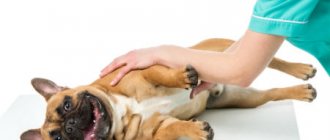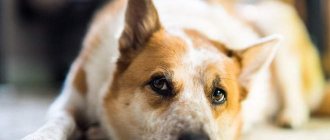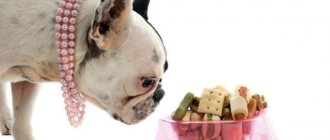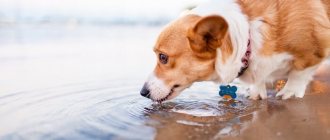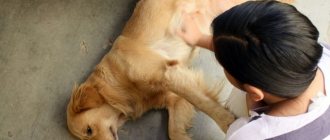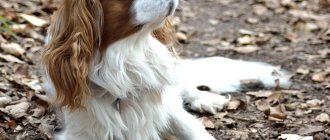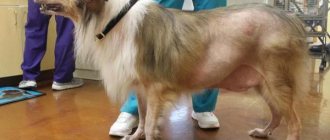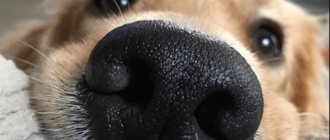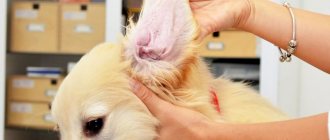The tongue of four-legged pets is very sensitive. With its help, they explore the world and record new information. Despite this, licking objects too often should not be ignored. If your pet constantly licks the floor and other surfaces, find the reason for his bad habit. In the absence of pathologies, behavior correction will be sufficient, and if they are confirmed, you will have to contact a veterinarian.
1. Reasons why a dog licks the floor, ground, concrete - Studying taste and smell - Lack of vitamins - Attracting attention - Boredom - Stress or illness 2. Licking other surfaces - Furniture or carpets - Walls, stones and other objects on the street 3. Why uncontrolled licking is dangerous 4. What the owner should do – Weaning a bad habit – When you need veterinary help
Reasons why a dog licks the floor, ground, concrete
Don't panic ahead of time. Analyze recent events and try to identify the cause of the strange behavior yourself. In most cases, the problem can be solved on your own.
Study of taste and smell
All babies, including puppies, are characterized by curiosity. They explore the world not only through smell, hearing and sight, but also through touch.
Most dogs are attracted to tasty and unusual smells, so don't be surprised by licking the floor or ground. These surfaces are likely to smell like a cleaning product or contain traces of fallen ice cream.
Lack of vitamins
If your pet's tongue is partial to the earth, take a blood test for vitamins. This behavior is typical for vitamin deficiency, that is, a deficiency of individual microelements. It is fraught with anemia and immunodeficiency, so this problem should not be ignored.
The risk group includes animals that receive little bones and meat in a natural diet. Excessive thermal processing of food also plays a big role. High temperatures destroy not only helminths, but also substances beneficial to the body.
To attract attention
Periodic licking of the floor is typical for pets who are often left alone. In this way they attract the attention of their owners. The problem is that such a habit can develop into serious mental problems.
Boredom
Unlike feelings of loneliness, boredom occurs due to hyperactivity. Rare and short walks, as well as a complete lack of physical exercise, do not allow you to splash out the accumulated energy. Because of this, the dog has to be redirected into strange activities and all sorts of pranks.
Stress or illness
Obsessive licking of surfaces is characteristic of stress. A short-term nervous disorder is not dangerous and goes away on its own after a few hours or a day. If the situation worsens over time, try to eliminate the irritant and consult a veterinarian about the possibility of taking sedatives.
In addition to stress, your pet should be checked for the following diseases:
- intestinal obstruction;
- gastritis;
- hypothyroidism;
- pancreatitis;
- helminthiasis;
- intestinal dysbiosis;
- gallbladder pathology;
- cardiovascular disorders;
- oncology;
- dental problems.
Separately, it is worth noting swallowed foreign bodies. They can get stuck in the teeth, throat, esophagus, trachea, stomach or intestines. In the first case, the problem is noticeable to the naked eye, but in all others it can be identified by the accompanying symptoms of indigestion.
Dehydration
Owners not only need to monitor the correct diet of the pet, but also provide it with constant access to clean water, especially when feeding it with ready-made food. If your dog doesn't drink enough water, it will lead to dehydration. The animal tries in every possible way to obtain the missing moisture.
Situations where a dog licks condensation on a window, a just washed floor, or objects that do not contain moisture at all should alert the owners. In such cases, it is necessary to check whether the dog is provided with sufficient water. Dehydration can seriously harm your pet's health, so make sure your water bowl is always full.
Licking other surfaces
In addition to the floor, earth and concrete, the animal may be interested in interior items, walls and even stones. The reasons for licking in these cases are similar to the previous ones.
Furniture or carpets
Lint on furniture and carpets irritate the vomiting center, stimulating an attack of nausea. With the help of these items, pets clear their stomachs of hairballs or after overeating. This behavior is typical in winter, when there is no fresh grass in the four-legged diet. A year-round solution to the problem is malt paste.
Another possible reason is the attractive smell. If a carpet or sofa has been damaged by falling ice cream, then a dog’s keen sense of smell will not ignore this oversight.
Walls, stones and other objects on the street
Licking cement walls is associated with calcium deficiency. This element is part of whitewash. Growing puppies and pets who have recently given birth are especially interested in it.
If a dog licks foreign objects only on the street, then it is simply attracted to unfamiliar smells. She tastes them with her tongue.
Interest in stones is usually also associated with the odors remaining on it, but biting them is associated with changing teeth and problems within the body. Such behavior should be stopped, as the four-legged animal can damage the enamel.
The fourth reason is taste perversions.
Allotriophagy, or taste perversions in dogs, is a phenomenon in which dogs begin to eat inedible objects - socks, threads, paper, soil, feces, stones.
The causes of this condition in animals are not well understood. There are theories that this behavior is influenced by a lack of vitamins and minerals, diabetes, intestinal parasites, as well as stress, boredom and decreased activity. Some dogs can also attract the owner's attention in this way if they don't have enough of it.
Why is uncontrolled licking dangerous?
Even the cleanest owner will not be able to achieve sterility of all surfaces in his home, let alone the street. Uncontrolled licking is dangerous due to the following consequences:
- Infestation with parasites. Street soil contains a large number of bacteria and worm eggs.
- Gastrointestinal disorders and poisoning. In addition to parasites, sand particles also carry poisons and chemicals that settle in the soil into the body. At home, the cause of sudden vomiting or diarrhea may be detergent.
- Intestinal obstruction. An accidentally swallowed stone or other large object can completely block the path for waste of feces, which can lead to severe intoxication.
Please note that prolonged obstruction can be fatal due to intestinal rupture. In this case, urgent surgery is necessary to save the animal, so do not neglect the examination when the first signs of illness appear. A swollen and painful abdomen, as well as the absence of bowel movements for 2 days, should alert you.
When to sound the alarm
To determine the disease that caused the vomiting, you need to conduct an external examination. You should be concerned if you notice an uncharacteristic smell from the mouth:
- Ammonia or urea, which is a sign of kidney failure. A sharp manifestation may indicate heavy metal poisoning.
- The smell of acetone, which may be a sign of diabetes.
- Putrid odor, indicating diseases of the intestines or oral cavity.
Typically, these dog health problems are chronic and should be treated by a veterinarian. He performs a full range of diagnostic measures, prescribes treatment and the right diet.
Obsessive licking of the carpet and/or floor covering also occurs in other diseases:
- Stomach upsets. To solve it, you should let the dog starve and change the diet.
- If the dog begins to lick the carpet pile in fits, against the background of poor appetite, this indicates signs of chronic recurrent gastritis or ulcers.
- Incorrect amount of food consumed. Food that has not had time to digest wanders through the stomach and is excreted back. Usually, after vomiting in such cases, the dog can feel good and cheerful.
- Aggressive reproduction of worms entering the stomach.
What should the owner do?
The algorithm of actions depends on the cause of the unwanted behavior. In almost all cases, the owner can cope with the problem on his own.
Weaning off a bad habit
Elimination of provoking factors and proper education will help wean one from a bad habit. When choosing a tactic of struggle, start from the reason:
- Lack of vitamins
. Add porous bones, fresh fruits and vegetables, meat and bone meal, ash, crushed chalk and a sufficient amount of raw meat with boiled offal to the menu. The use of ready-made vitamin complexes is permissible only after testing. If you use ready-made food, gradually change the brand.
- To attract attention
. Try to devote all your free time to your pet and do not leave him alone while you are on vacation or a business trip. At this time, it is better to give the dog to relatives or friends.
- Boredom
. Walk your four-legged dog at least 2 times a day and diversify your walks with active games or exercises. When choosing a training program, take into account the breed characteristics. A collection of interactive toys wouldn't hurt either.
- Stress
. Be patient and let your dog get used to the new environment. Pet her only after she stops licking the floor. Otherwise, stroking and hugging will be perceived as approval.
Banning commands and the distraction method will help correct unwanted behavior. When you notice licking, use the words “Ugh” and “Don’t,” as well as sound stimuli such as popping, whistling, and squeaky chew toys.
Cleansing the stomach as a natural process
Experienced dog owners know that their dog loves to chew grass and regurgitate it while walking. They take this calmly, since such a procedure for cleaning the stomach is a natural need of the animal. Similar to this is carpet licking, which aims to collect obstructive deposits in the stomach on the swallowed cake and get rid of them.
An experienced dog breeder will not attach any importance to this if such attacks of personal hygiene are not chronic and obsessive in nature and occur no more than once or twice a week. If a dog constantly licks the carpet pile and eats grass, this indicates excessive secretion of bile and its entry into the stomach. This means that the owner overdid it with fatty foods for his pet. Associated signs of improper feeding are soft stools and rapid greasy fur.
An attentive owner has a healthy dog
If a dog licks fur or eats grass, it should regurgitate what has entered its stomach. If the vomit contains no blood or worms, and the dog feels cheerful after such a procedure and does not have a fever (cold wet nose), then this is not a reason to panic. The main thing is unobtrusiveness and frequency. In this case, you can play it safe and put the dog on a diet (take a break from feeding) and observe the dynamics of his behavior. The life and health of pets depends on the attentiveness of the owner!
Average score of ratings is more than 0
Share link
Comments There are no comments yet, but you could be the first...
Obsessive-compulsive disorder in dogs
Some dogs have mental health problems beyond just anxiety. The number one long-term mental illness leading to carpet licking is OCD (obsessive-compulsive disorder), which some breeds, such as bull terriers and Dobermans, are predisposed to. According to Pet Place, other behaviors that may indicate OCD may include clicking at non-existent flies, excessive tail chasing, air licking, and skin sucking.
If you suspect your dog has OCD, contact your veterinarian, who can recommend a personalized course of action for your pet.
Irritations and injuries
We are all familiar with the expression “licking your wounds.” Thanks to the wonderful properties of saliva, “licked” wounds heal and heal faster. Additionally, "licking" is an evolutionary behavior. The dog washes away any dirt that has gotten into the wound, removes sharp edges, etc. However, try not to encourage this behavior in your pet. Leave wounds and injuries to your veterinarian and do not rely on self-medication. In some cases, the intervention of the tongue does not in any way contribute to speedy healing, but only aggravates the situation.
Negative effects of excessive licking
Dog tongue, known for its healing powers, does help heal wounds in some cases, but it can also cause more harm. As a result of constant licking, the hair begins to fall out, then the top layer of skin is licked off. A local inflammatory process develops, the temperature rises, and swelling appears. All that remains is to add moisture from the tongue and obtain ideal conditions for the development of fungus and bacteria. They cause a secondary infection, which can spread from the original site to another (spread by the same language) and even become systemic. The inflamed areas become chronic and are called granulomas. Over time, they can lead to a wound that stops healing.
This is Love
There is another version among dog breeders. They believe that the act of licking is a way of expressing emotional affection and love for a specific person. That is, the dog licks the owner’s face because he loves him, but does not know how to say it. Therefore, she expresses love using methods available to her. Some owners noted that the animal does this especially actively in the presence of other people.
Dogs cannot use the same methods that people use to show their love. The animal cannot say “I love you”, so it licks the person. In a similar way, puppies lick their mother and each other. This is an expression of feelings.
There's something wrong with you: why dogs lick their owners
When we see a dog licking its owner's face, we perceive it as something cute and self-evident. However, pets slobber on people for a reason. Sometimes this behavior indicates that it is worth contacting a veterinarian. In our article we will tell you what can cause dog kisses and how to distinguish attention from health problems.
The dog shows his good attitude
When a puppy is first born, the mother licks its nostrils with her tongue so that it can begin to breathe. Throughout their life, puppies lick their brothers and sisters, gaining affection with them. So, if a dog exhibits this behavior towards a person, it may be due to its childhood memories and the fact that it is trying to show how much it cares for its owner. Yes, for us this may seem like something cute and funny, like a game, but the dog will really only lick the person he trusts and wants to get close to.
Your pet wants to chat with you
Dogs' wild ancestors, wolves, use licking to communicate with each other. For example, if a puppy licks its mother, it means that it is hungry and is trying to find some food in its mother’s mouth. Of course, not all dogs have retained such an instinct - it all depends on how far the breed of your faithful friend has moved away from the wild wolf. However, if the puppy suddenly starts licking your face, then you should think about the last time you gave him food - it is quite possible that he is very hungry and is trying to tell you about it.
Animal showing submissiveness
A dog will never lick the face of a stranger or a person he doesn't trust. Some particularly loyal breeds of dogs (for example, a German shepherd) try to show their submissiveness in this way, saying: “Master, you are in charge here, so command, lead.” It is especially worth paying attention to this behavior if the pet began to lick you during a noisy domestic quarrel or thunderstorm. By licking the owner's face, the dog shows that it completely obeys the person and wants him to protect it. So you shouldn’t immediately push the animal’s face away, but rather think about how you can calm it down.
Dog kisses as a sign of health problems
If one dog, for no apparent reason, began to carefully lick another, this may indicate that the object of attention and care is suffering from an undiagnosed disease. Inspect the area where your dog is licking to see if there is an open wound, an insect bite, or lichen. Even if you don't find anything, don't neglect the opportunity to contact your veterinarian for help. Perhaps your pet is worried about irritation or allergies, or maybe something more serious. A professional will be able to not only carefully examine the animal, but also take tests (blood, saliva, feces) from it to determine further treatment.
Just a characteristic feature of your dog
If your pet constantly licks you and other animals, this is not a reason to sound the alarm. It has been noticed that some dogs are simply bored, as a result of which they begin to show care and attention towards others. If you are sure that your pets are healthy, just find them something interesting to do, such as going for a run or playing catch in the yard. In addition, when dogs lick themselves and each other, endorphins (happiness hormones) are released. So if a male dog begins to lick someone often, perhaps it’s time to look for a bitch to mate with.
The dog is worried about its owner
By licking a person, a dog can demonstrate its care towards its owner. If you suddenly get dirty, your pet may decide it's time to take a bath. However, we should not forget that pets are able to sense the emotional background surrounding people. If you are in pain, the animal will try to comfort you by licking, just like its mother did. By the way, if the dog starts licking your open wound, do not rush to move his muzzle away. Dog saliva is not only excellent at killing bacteria, but also promotes rapid healing of wounds.
Behavioral problems and dog paw licking
If health problems have been ruled out by your doctor, your dog is most likely licking his paws for behavioral reasons. The doctor is able to ask the right questions to determine from your answers the dog’s behavior and suggest what to do next. The behavioral cause is simply boredom, signs of stress, fear or anxiety.
Paw licking may start out of boredom and then develop into a relaxing or satisfying habit for your dog. In severe cases, the dog may have obsessive-compulsive disorder, causing it to obsessively lick its paws.
An easy way to deal with paw licking behavior is to distract your dog. Take the animal for a walk, play with them more often, offer them a new toy. Do anything that will help focus and keep her attention on something. Don't scold them for licking, but don't reward them with treats either.
How to stop a dog from licking its paws?
If the licking continues, think about how to stop your dog from licking his paws? To do this, you can resort to methods of controlling and changing the dog's behavior to help him.
Tips to help stop your dog from licking its paws (but you should resort to them only after ruling out health problems):
Dog licks carpet, health problems
Licking attacks can be caused by:
- acute, chronic pathologies, diseases of the digestive tract (gastritis, pancreatitis, inflammatory processes in the mucous membrane of the stomach, intestines, erosive, ulcerative lesions of the gastrointestinal tract);
- metabolic disorder;
- neurological pathologies, disorders caused by severe head injuries, spinal injuries;
- dental problems (gingivitis, tartar, stomatitis, gum disease);
- allergic manifestations;
- severe helminthic infestation;
- renal failure;
- intestinal disorder, stomach upset;
- the presence of a foreign body in the pharynx, esophagus, stomach.
As we can see, such a compulsive disorder can be caused by serious systemic and functional disruptions in the dog’s body. Therefore, carefully observe your pet, analyze in what periods, how often and with what frequency the dog licks the carpet and floor.
Dating method
Probably all pet owners have noticed that when meeting a new person, the dog always sniffs and sometimes even licks the people who came to visit you. Thus, the receptors located in the nose and on the tongue of the animal accumulate and store unique information about the stranger, and help to immediately recognize him the next time they meet.
There is also an assumption that animals like the taste and smell of the human (especially a little sweaty) body, and the texture of the skin. Many are sure that four-legged animals lack some trace elements or salt, which are released through sweat. It has not been scientifically proven, but it is likely that this is another reason why a dog licks its owner.
Taste and aroma
Hand on heart, you and I also taste many things and objects. Well, almost everyone was guilty of this in childhood. You have to study a thing from a variety of angles, try to understand all its properties. Dogs do much the same. True, they can also boast an “additional” olfactory organ - the so-called vomeronasal organ (Jacobson's organ), located in the upper part of the palate. With the help of Jacobson's organ, four-legged friends look for partners for mating, recognize familiar dogs, greet them, and also smell people. And in general they get a “3-D” olfactory image.
Foreign bodies in the throat or digestive tract
If a puppy frantically licks the carpet, after which he vomits and cannot go to the toilet for a long time, you should think about intestinal obstruction. This happens if your pet swallows a large bone or piece of a soft toy. In such cases, the animal must be urgently taken to a specialist, as surgery will most likely be required.
Read also: Why doesn't a goat eat?
Attention! Intestinal obstruction can also cause gradual bloating, but constant gagging does not cause vomiting.
If your dog is licking the floor, at the first sign of vomiting it is worth considering options for placement of the foreign body:
- In the mouth you can usually find sticks or bones stuck between the dog's back teeth. One of the first symptoms is frequent movement of the jaw and copious flow of saliva, the pet rubs its face with its paws, and sometimes there is bleeding from the mouth in small quantities. Surgery may be required to remove a foreign body from the mouth; you should contact a clinic.
- A foreign body in the throat causes signs of sudden suffocation and nausea. This condition requires immediate intervention. The owner can lift the dog by its hind legs and shake it as first aid. In emergency situations, you can sharply squeeze the sides of the chest several times.
- In the esophagus, a foreign body is accompanied by vomiting after eating and dehydration. To check, you need to collect a fold of skin on the dog’s withers and release it; it should soon return to its previous state.
- In the trachea and lungs, the foreign body causes general oppression of the dog, which increases at high speed.
- The presence of a foreign object in the stomach is more difficult to diagnose. Sometimes they can remain in the organ for several years without showing symptoms. If it moves, periodic vomiting occurs.
- In the small intestine, the object causes uncontrollable vomiting, dehydration, and severe pain in the abdominal wall.
- There may be sticks, bone fragments, and needles in the rectum. Because of this, the dog hunches over, becomes constipated and has blood in its stool.
At the first sign of a foreign body in a dog’s body, you should consult a doctor.
Read also: Hoarse voice in a child
The wall is not easy to digest
First of all, it is interesting to note that eating non-edible substances is something that scientists have studied extensively. In particular, it is studied by veterinary ethologists and nutritionists, and If you know anything about these two fields, you will know that the reason your dog is licking the wall is likely related to nutrition or behavior...
This condition is called pica, and is defined as the consumption of materials and substances that are not part of the animal's normal diet. Obviously, a wall is not something dogs typically eat.
At first glance, there is no reason why they should do this. When a dog rummages through the trash, he is probably looking for leftovers that he threw away. But a dog licking a wall is harder to explain.
Pathologies
By contacting your veterinarian immediately after an attack, you are more likely to receive an obvious diagnosis. The logic is very simple; in most cases, this diagnosis is confirmed and treatment helps. There are also exceptions that need to be taken into account. Before treating your dog for a non-existent disease, carefully analyze the situation.
Gastritis is inflammation of the inner lining of the stomach . The mucous membrane performs very important functions, but when it is inflamed or irritated, a number of symptoms occur:
- Severe nausea and vomiting - food is not digested correctly, which is noticeable visually.
- Diarrhea.
- Plaque on the tongue.
- When palpating the peritoneum, the dog is in pain - the animal often licks the belly.
- Improper functioning of the stomach (visible during ultrasound examination).
- Refusal to eat, rapid weight loss, deterioration of coat and skin condition.
Making an anamnesis
Of course, you can grab your pet and rush to the vet, but this is guaranteed to lead to one of two results:
- The doctor will say that the dog is healthy.
- Against the background of vague assumptions, a diagnosis will be made and treatment will be prescribed.
Both options are incorrect, since treating something that is not there will not help, and healthy dogs do not suffer from seizures. If you notice that the dog is feverishly licking the floor, observe, or better yet, write down everything that happens. Too much, including the diagnosis, depends on the anamnesis. Based on the experience of owners and doctors, several similar scenarios of dog behavior can be identified.
The most common option is that the dog came from a walk, ate with appetite, drank water, and felt good. After 30–60 minutes, the pet begins to behave restlessly and slurp. The dog licks its nose and salivation increases. Anxiety grows and the four-legged animal begins to lick the floor, carpeting, window sills, etc. At the same time, the dog swallows everything that is on the floor (dust, small debris, wool).
The second option is that the dog begins to lick the floor and everything that catches its eye after eating. In practice, it has been noticed that the type of nutrition and the quality of feed (for the industrial type) are not particularly important. The attacks do not depend on the breed, since owners of both outbred and pedigree dogs contacted veterinarians. In most patients, diarrhea begins after a decrease in activity.
The third option is that the attack occurs on the street, the dog licks everything it sees from the ground, greedily swallows grass (fresh and dry), leaves, soil, and small stones. In fact, this option is the most dangerous, since it is difficult to stop the dog, and it can swallow anything.
The fourth option is that the dog licks the floor under stress, for example, after punishment, a loud sound, a rude command, etc. As in the first option, the dog hides, slurps, often licks its nose and breathes heavily.
The attack also ends in different ways, the most popular are two options:
- A tired dog begins to hiccup, drinks water and eventually falls asleep.
- The four-legged animal coughs and vomits white foam.
With this development of events, the clear reason for the behavior is a severe attack of nausea and a nervous reaction in combination . Having even modest experience in keeping dogs, one can come to this conclusion logically. It is much more difficult to identify the causes.
Attractive aroma from things
The most important sense organ in dogs is smell. If a person perceives most of the information about the world around him visually, then dogs need to smell or taste for this. They are acutely aware of aromas that people may not notice at all. If a person or things smell like something pleasant, then this will attract the animal’s attention; he will not only actively sniff, but also lick, trying to taste this or that object. If the aroma is unpleasant, then the dog can also lick this object to get rid of such a smell.
Final thoughts
It is important to rule out illness and anxiety when trying to deal with your dog's floor licking. You should visit your veterinarian to make sure nothing else is going on. Ignore your dog when he starts licking the floor. This includes swearing. Instead, you'll want to look at the big picture and come up with some effective solutions to stop the behavior.
When pets start licking the floor, owners at first just laugh. They think it looks funny and even worthy of being photographed or filmed. But in fact, such behavior should alarm the dog owner, because most likely it indicates a disease.
If your pet is licking the ground, this may indicate a serious illness.
- Why does a dog lick the floor: reasons
- Why do dogs sometimes lick the carpet, sofa and choke, what to do in this case
- Why can a dog lick concrete?
- When to sound the alarm
- Foreign bodies in the throat or digestive tract
- Cleansing the stomach as a natural process

